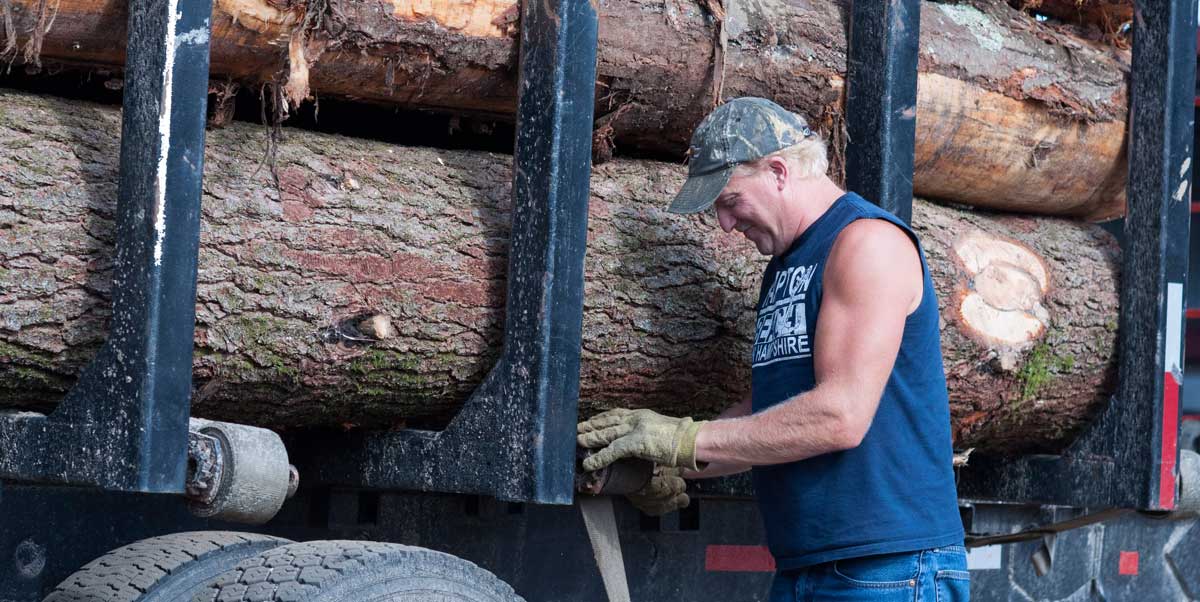The Vermont Sustainable Jobs Fund has provided leadership on a number demonstration projects, assisted with industry level strategic planning, and provided business assistance, network and supply chain coordination services for the forests products industry since 1999.
Forest Products

VSJF’s engagement in the forest products sector led to the creation of the Vermont Forest Products Program to create and retain quality jobs, open additional markets for locally produced forest products, and improve economic development in the forest products industry.
Indications of Progress in Vermont
- Seventy-five percent of Vermont’s land mass is covered in forest and the industry generates $1.5 billion annually in economic output. The environmental and economic viability of Vermont’s forested landscape depends on a healthy forest products industry to sustainably manage, harvest and utilize Vermont’s forests.
- In 2016 there were 6,269 jobs in the forest products industry, down from 9,739 in 2002, a 36% decrease.
- In 2016 there were 2,107 forest products businesses, down from 2,370 in 2002, an 11% decrease.
- Twelve percent of Vermont households (31,051) burned at least some wood pellets for space heating, while 38% of Vermont households (96,951 households) burned wood in some form for at least some space heating.)
- Vermont’s Comprehensive Energy Plan set a target of 35% thermal energy coming from woody biomass by 2030. As of 2017, 21% comes from woody biomass sources.
The Vermont Wood Manufacturers Association has partnered with the Vermont Sustainable Jobs Fund for many years on various industry projects to support wood manufacturers in the state. We are so pleased to be working with VSJF currently to create opportunities to grow the industry and improve consumer interest in wood products.
VSJF Program and Service Results
Strategic Planning
Over the past 20 years, alongside our industry partners, the Vermont Sustainable Jobs Fund has provided industry-level analysis, worked to identify and fill gaps in supply chains, and developed opportunities for new products and overall market growth.
- The Working Lands Enterprise Board’s Forestry Committee (VSJF serves on the committee) worked with Yellowwood Associates to conduct a year-long supply chain planning process (2014-2015) which engaged more than 100 industry members through surveys, key informant interviews, focus group sessions, supply chain workshops, and a statewide summit. Through this process the Vermont Forest Sector Systems Analysiswas published and is providing the action plan for the VSJF’s Forest Products Program.
Supply Chain Coordination
Supply chain action teams in the Vermont Forest Products Program are comprised of members with knowledge or expertise from throughout the forest products supply chain and are working to advance the development of specific products including: mass timber, wood heat, and locally sourced wood products.
Network Development
The Vermont Forest Industry Network, launched in 2017, works on initiatives that no single business or organization can tackle alone. It brings together industry professionals and trade association partners throughout the state to encourage
- In 2017, in partnership with the Working Lands Enterprise Board, two industry-wide meet-ups and a listening session were held to build network engagement and industry collaboration.
- VSJF is planning an industry-wide forest products summit in 2018.
Business Assistance
VSJF’s business assistance services have supported the development and expansion of a number of Vermont’s high quality forest products businesses by providing individualized and tailored business coaching and entrepreneurial support. Businesses such as the Vermont Wood Pellet Company, Cooperman Fife & Drum, Vermont Farm Table, Ironwood Brands and WallGoldfinger have all benefitted from business coaching and peer to peer advising services VSJF has provided.
Sustainable Wood Guide Specifications
Sustainable Wood Guide Specification documents, or “Green GuideSpecs” focus on single construction material groupings (like wood flooring or cabinetry) and help architects, and designers tie specific resources (like Vermont sustainably harvested wood) to project applications. This version of the Guide Specs focus on FSC certified wood and efforts are underway to develop a second version which focus on Vermont local wood sourcing. Originally completed in 2009, the wood guide specifications are being updated for 2018.
Harvest for Use Initiative
To take advantage of increasing consumer interest in wood products made from Forest Stewardship Council (FSC) certified forests and ‘chain of custody’ manufacturers, VSJF teamed up with Redstart Forestry, Allard Lumber Company, Champlain Hardwoods, and Copeland Furniture to market test two product lines that were FSC certified and made from Vermont maple. The goals of the pilot project were to shepherd Vermont-grown FSC logs through the supply chain all the way to finished product and to capture a 5 – 15% premium in the marketplace for all the parties involved –from the landowner to the logger to the mill to the manufacturer. While the 1 year pilot proved that the chain of custody for certified wood could be maintained throughout the harvest for use process, the Great Recession of 2009 prematurely ended this important initiative.
- In 2008, Allard Lumber agreed to pay between 10-15% more per 1,000 board feet for the Vermont-grown FSC certified logs that would be part of the pilot project. In turn, Copeland designed a new set of marketing materials and revamped their logo to differentiate themselves and to take advantage of the growing trend towards ‘place-based’ marketing of products.
- Redstart Forestry, a consulting forestry firm with about 70,000 acres under management, developed a GIS-based wood supply forecasting system which allowed them to determine how many board feet, of what species, and on what parcels, harvests would be scheduled in any given year.
- Redstart Forestry collaborated with three other consulting forestry firms to develop a new company, the Forest Partnership L3C, along with a business plan and revenue model to jointly supply Vermont-FSC certified wood to the marketplace.
Cornerstone Project
The Cornerstone Project was an import substitution initiative aimed at marshalling the purchasing power of Vermont’s major institutions to buy local forest products. With increasing interest in forest sustainability and growing demand for green building at universities and in state government, the Cornerstone Project also encouraged the purchase of certified forest products.
- Over $1 million in grants were made to support forest products development and green building projects from 1998 to 2007.
- A five-year project involving Vermont Family Forests (VFF), the National Wildlife Federation, and VSJF created a model of community-owned forestry. In 2006, VFF offered shares of the Little Hogback Community Forest–held in easement by the Vermont Land Trust–to Addison County citizens (50% of the shares are reserved for community members with below median incomes). Harvests from Little Hogback were used to create FSC-certified flooring that was sold at Planet Hardwood in St. George.
- To increase the supply of FSC-certified wood, VSJF worked with Vermont Family Forests and the National Wildlife Federation, to establish the “Vermont Family Forestry Partnership,” a multi-year effort to develop a community forestry organization, certify 7,000 acres of forests, and promote the manufacture and sale of certified forest products.
- VSJF initiated a ‘buy local’ initiative that connected purchasers like Middlebury College for its Bicentennial Hall, the State of Vermont and UVM with Vermont craftspeople.
- In 2002, Middlebury College (a Cornerstone Project founding member) opened three buildings, a residence and dining hall that incorporated 58,000 b.f. of green certified wood from five local woodlots in Vermont and a Recycling Center that utilized 16,000 b.f. of spruce harvested from college land in conjunction with Vermont Family Forest and third party certified by the Forest Stewardship Council (FSC).
- In 2000, VSJF funded Vermont Built Green, an effort by members of Builders for Social Responsibility and the Vermont Energy Investment Corporation (VEIC) to develop a residential standard for green certified homes.
Our firm has grown from a sole proprietorship to a complex and vertical wood products manufacturer and design office over twenty years, taking advantage of small business counseling resources at every step. When we decided to engage with VSJF’s business assistance services, we began a “deep dive” that challenged our whole team, clarified our transition plan, and let us work on our business through a series of hurdles that I am sure as an owner we would not have survived so well without the help of VSJF.




